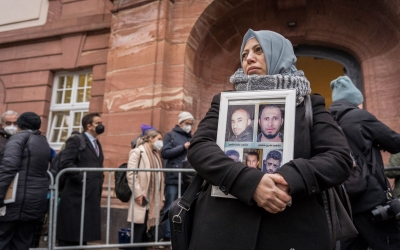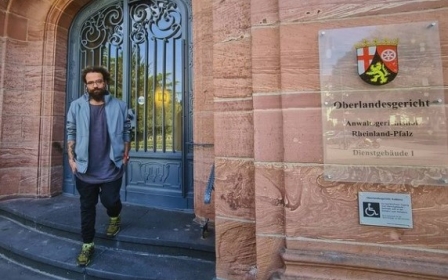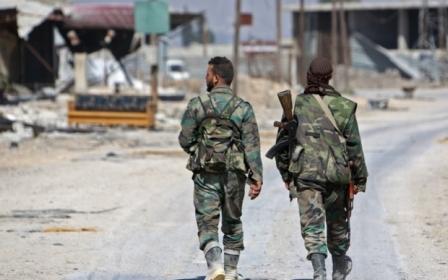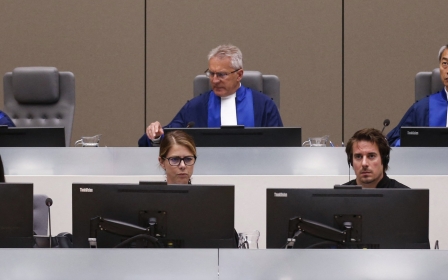Syria: Lawyers call on ICC to probe Iran's responsibility for war crimes

Lawyers representing Syrians forced to flee their country during the ongoing war have called for the first time on the International Criminal Court to investigate Iran’s role, alongside those of Syrian officials, in perpetrating alleged war crimes.
Iran's contribution to the decade-old conflict has been "substantial", the lawyers argue, including deploying Revolutionary Guard forces and paramilitary groups, training Syrian fighters, and sending billions in financial aid, arms and technology.
Little public attention, however, has been paid to Iran's legal responsibility in the war, a situation UK barrister Haydee Dijkstal and US-based lawyer Gissou Nia hope the ICC's prosecutor will change by opening an examination to look closely at its accountability.
"The goal of this is to find justice for Syrian victims who have for so long not had an avenue for criminal responsibility for those perpetrators, whether it be the Syrian government or Iranian forces or other international actors," Dijkstal told Middle East Eye.
The road for Syrians seeking justice and accountability has been a rough and winding one which has left many tired and frustrated even as they continue their fight for justice.
Syria is not a signatory to the Rome Statute, so the UN Security Council would need to pass a resolution to refer the country before the ICC, something permanent members Russia and China have blocked.
Short of this, international human rights lawyers have made several alternative efforts both at the ICC and in European courts to hold Syrian officials and others accountable.
Last month, a German court in Koblenz made a landmark decision sentencing Anwar Raslan, a former Syrian intelligence officer, who oversaw the torture of 4,000 people, to life in prison for his crimes against humanity.
The latest attempt at justice for Syrians is the 64-page submission to the ICC written by Dijkstal and Nia. The latter is also the board chair of the US-based Iran Human Rights Documentation Center monitoring group, which submitted the request to the prosector's office on Monday.
'Fearful for their lives'
Specifically, they argue that in addition to Syrian government officials, individuals from Iran and its Revolutionary Guard perpetrated, aided and abetted crimes against humanity against their Syrian clients, which forced them to flee to Jordan.
The Quds Force, Iran's elite Revolutionary Guard unit tasked with overseas operations, trained Syrian paramilitary groups that have been linked to atrocities against civilians, they said.
Additionally, Iran deployed thousands of Iranian soldiers and Iranian-backed paramilitary groups, including Lebanese Hezbollah, Afghan Shia militia Liwa Fatemiyoun and Liwa Abu Fadl al-Abbas, which fought alongside Syrian forces, the lawyers said.
'We'd like to be able to address so many other crimes that have happened in Syria, but this is the window of jurisdiction that we're allowed to act with'
- Haydee Dijkstal, UK barrister
In several instances, they said, Revolutionary Guard forces carried out large-scale operations which indiscriminately targeted civilians, including starving and displacing them.
The Syrians who are offering evidence for the complaint and whose identities are not being shared publicly for fear of reprisal include journalists, activists and others who were documenting human rights abuses at the time they were forced to flee.
One told MEE that starting in 2012, they watched as large numbers of Syrians started to leave their city: "Either they were being pursued by the Syrian regime or they were fearful for their lives because of the atrocities and abuses committed by the Syrian regime, its followers or the forces and militias loyal to Iran."
That the Syrians were forced to flee to Jordan is a critical point. So is a 2018 ICC case involving Rohingya people who were forced to flee Myanmar for refugee camps in Bangladesh.
In this case, the ICC found that it had jurisdiction to look at allegations against Myanmar's security forces because, even though Myanmar isn't party to the ICC, Bangladesh is.
Similarly, Jordan is a party to the ICC, so there is a sense that the Rohingya case could be used to give the ICC jurisdiction to look at the Syrian conflict.
'Biggest case ever opened'
Prior to this week's communication, at least two other petitions have been filed since the 2018 ruling, asking for investigations into Syria to be opened.
The ICC has no deadline by which it must decide on whether to open an examination. There were hopes a decision would be made before ICC chief prosecutor Fatou Bensouda's mandate ended in 2021, but that didn't happen, leaving the decision to the prosecutor's office now led by Karim Khan.
Toby Cadman, a UK barrister who filed one of the earlier Syria petitions in 2019, said he believes the reason the ICC has yet to open a preliminary examination is that it would be the biggest case the court had ever opened which would require significant time and money.
"The ICC is already struggling with resources and states are not funding it as they're supposed to [and] as they have committed to. There is a great deal of reluctance to engage just because they don't feel as though the ICC has delivered," Cadman told MEE.
'Holding perpetrators accountable for atrocities in the Syrian conflict is essential for the victims, but more than that, states cannot emerge from conflict unless there is a process of truth and justice'
- Toby Cadman, UK barrister
"My view always has been that the reason for that is because they've never been given sufficient resources to do that. And if you want it to go after the big players, then you've got to give them the money to do that. It takes time."
Dijkstal said having multiple submissions focused on Syria should only be positive. "Our hope would be that [this week's submission] would help strengthen the impetus to open up a preliminary examination because of the scope of the crimes," she said.
However, both she and Nia pointed out that in order to fit the ICC's jurisdiction, they have had to limit the crimes on which they've focused.
"This is a very narrow slice of what's happened because the crimes have to be transboundary in order to fit this narrow jurisdictional pathway. But it's a lot more extensive than that if we look at Iran's responsibility," Nia said.
Added Dijkstal: "We'd like to be able to address so many other crimes that have happened in Syria, but this is the window of jurisdiction that we're allowed to act with."
But deciding to carry out the probe itself, said Cadman, would be powerful. Beyond holding perpetrators accountable, which is essential for victims, it will send a message to warring parties to bring an end to the conflict - and it will be neccessary for Syria to emerge from it. "States cannot emerge from conflict unless there is a process of truth and justice," he said.
Middle East Eye propose une couverture et une analyse indépendantes et incomparables du Moyen-Orient, de l’Afrique du Nord et d’autres régions du monde. Pour en savoir plus sur la reprise de ce contenu et les frais qui s’appliquent, veuillez remplir ce formulaire [en anglais]. Pour en savoir plus sur MEE, cliquez ici [en anglais].





